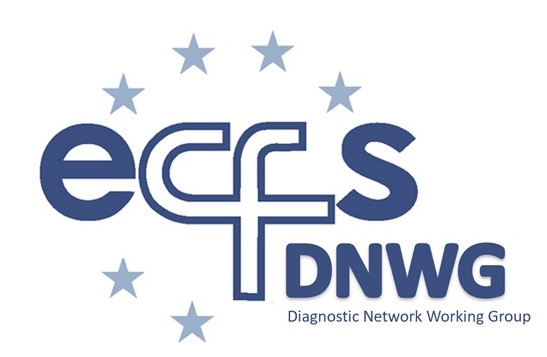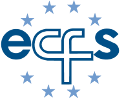
Sweat test
− Training sessions (sweat test ‘Hands On’)
− ECFS DNWG steering document to improve the performance of the sweat test across EuropeStep-wise sweat test protocol (SOP) on the ECFS website after finalizing the position paper
Improving sweat test performance in Europe: development of new ECFS DNWG training resources: From a European ECFS DNWG sweat test survey we have learned about important deficiencies/barriers in routine sweat testing in real life in Europe (Cirilli N et al. JCF 2017). The ECFS DNWG therefore has previously organized several Hands-on Training Workshops to improve practical sweat test performance in Europe. The last ECFS DNWG Sweat test Training Workshop „Practical aspects for improvement of CF diagnosis in Europe“ was held at ECFC Liverpool 2019. Due to conflict of dates in 2020 this workshop did not take place at the Middle-East CF conference this year. Unfortunately, due to the COVID pandemic, the planned session (Wed, 3rd June) has not taken place in Lyon. These Hands-on Training Workshops use the most up-to-date international guidelines and the ECFS CTN sweat test SOP, using the Wescor Macroduct system. Presently, we believe that more people can be involved in sweat test training by improving the currently available information on the ECFS DNWG-website. Along the filmed session of last year's Hands-on Training we are planning to publish a step-wise Sweat test protocol (DNWG-SOP), illustrated with pictures of each step and a Q&A document available on the DNWG website. As a group, we agree that information on sweat test performance without the equipment of Wescor, referring to the older Gibson and Cook method, should be available on the ECFS DNWG website, as this fits into the ECFS strategy to support low-income countries. Before we can achieve this, the sweat test working group is in charge of writing a new manuscript on how to perform a sweat test for diagnosing CF in Europe and beyond. A first draft has been made. After publication, the DNWG website will be adapted in line with the recommendations of the working group.
Project Core group: Nata Cirilli, Elke De Wachter, Nick Simmonds.
Project working group: Natalia Cirilli, Kevin W Southern, J. Barben, F. Vermeulen, A. Munck, M. Wilschanski, , N. Simmonds, E. De Wachter.
Some people involved in the core group are in charge of running educational programs around the world aiming to improve sweat test performance, including the South Eastern CF conference and Morroccan program.
CFTR biomarker: standardisation and diagnostic reference values
The "standard" test for diagnosing CF is the sweat test. However, an increasing group of patients cannot be diagnosed with the sweat test as results are in an intermediate range of CFTR dysfunction. Alternative tests have been developed to ascertain and further quantify the basic defect in CF, the lack of CFTR-mediated chloride ion transport. The nasal potential difference (NPD) test examines the chloride transport in the nose and the intestinal current measurement (ICM) examines CFTR function ex vivo in rectal biopsies. Both these tests have been further optimised in recent years, and new European SOPs have been developed by the ECFS DNWG for use as a diagnostic aid and for therapeutic outcome strategies in Europe. These SOPs for ICM and NPD will allow inter-centre comparison of results and reference values. The last step in the process is the finalization of the manuscripts of the validation studies for NPD and ICM
NPD core group: Inez Bronsveld, Isabelle Sermet, Michael Wilschanski
ICM core group: H De Jonge, Nico Derichs, Lutz Nährlich
Development of new guidelines on CFTR-related disorders (CFTR-RD)
CFTR-RD is a clinical entity associated with variable levels of CFTR-dysfunction, that does not fulfil the diagnostic criteria for CF. The Bombieri paper (JCF Bombieri 2011) discussed the utility of sweat testing, mutation analysis, nasal potential difference, and/or intestinal current measurement for the differential diagnosis of CF and CFTR-RD. Entities considered as CFTR-RD in this manuscript are CBAVD, acute recurrent or chronic pancreatitis and disseminated bronchiectasis with CFTR dysfunction. This paper dates from about 10 years ago. Meanwhile, new insights have been made (for example: the 2011 paper does not refer to CFTR2). The DNWG has decided to write new guidelines on CFTR-RD, not only focusing on differential diagnosis, but also on definition, care, treatment and long-term evolution. This project started in March 2020. Timelines are extended due to the COVID-19 situation.
CFTR-RD core group: Carlo Castellani, Kevin W Southern, Elke De Wachter, Nick Simmonds, Kris De Boeck
In the scope of this task 2 small projects, using an online questionnaire, have been set up together with young investigators (students):
− Do fertility clinics use the current recommendations to exclude CF in CBAVD men? A pilot study (Marlies Destoop, Elke De Wachter, Brussels, Belgium)
− How to diagnose difficult cases: is it CF, CFTR-RD or CFSPID? (Carlo Castellani and student, Genoa, Italy)
Latin American Newborn and Early Screening of Cystic Fibrosis Patients (LANES)
1st Expert Consensus Meeting in collaboration with the ECFS Diagnostic Network Working Group and Novartis
Objectives: Establishing an early diagnosis of CF in Latin America is suspected to be challenging due to several reasons, including heterogeneity of the population, availability and costs of diagnostic tests and lack of public awareness for CF in some countries.
Methods: An initiative by the ECFS Diagnostic Network Working Group aimed to better understand the current status of early CF diagnosis in Latin America. Expert representatives from 13 Latin American countries (Mexico, Guatemala, Costa Rica, Panama, Dominican Republic,Venezuela, Colombia, Ecuador, Uruguay, Brazil, Peru, Argentina, Chile) were invited to prepare a structured summary on the history and current situation of CF diagnosis in their country, and to share their experiences at the first Latin American Newborn and Early Screening of Cystic Fibrosis Patients (LANES) consensus meeting which was held in August 2015 in Sao Paolo, Brazil together with representatives from the ECFS DNWG and ECFS Patient Registry.
Results: Important differences and challenges in diagnosing CF were discussed, including epidemiology, CF newborn screening, sweat test, CFTR genotyping and use of CF registries.
Conclusion: The LANES project is the first joint initiative to summarise current practices and future perspectives for early CF diagnosis in Latin America. Increasing public awareness for early CF diagnosis was agreed to be of critical importance. Results from all attendees highlighted the significance and success of the LANES meeting, allowing for shared experiences to be discussed and future relationships and collaborations to achieve the best outcomes for CF patients in Latin America.
Results of this project were presented at ECFC Basel (Workshop 11) and at the ECFS DNWG Meeting in London. Publication of results is underway.
Real life practice of sweat testing in Europe and development of an ECFS sweat test guideline for diagnosis of CF (N.Cirilli, N.Derichs)
Project Core Group: Natalia Cirilli, Kevin Southern, Jürg Barben, Lutz Nährlich, Anne Munck, Michael Wilschanski, Kris De Boeck, Nico Derichs
The aim of the project is to better understand and improve sweat test practices in European countries, and to develop harmonised European recommendations on sweat testing in real life settings.
Main Objectives:
1) to assess current sweat test practice across Europe
2) to identify examples of good practice and challenges
3) to develop and agree minimal sweat test standards
4) to form a European consensus on recommendations for good real life practice
5) to develop training resources to support sweat testing services across Europe
This project started by performing a survey about the current sweat test practice in Europe.
First results of this project were presented at ECFC Basel (Workshop 11) and at the ECFS DNWG Meeting in Ljubljana 2017. The results of the survey have now been published in the Journal of Cystic Fibrosis 2017.
Next steps will focus on the development of training resources and recommendations to improve sweat test performance in Europe.
Complete CFTR gene mutation analysis in European patients with Cystic Fibrosis
(Project Leader: Harry Cuppens (geneticist) and Kris De Boeck (clinician))
AIM:
To provide a service for highly parallel sequencing of the complete CFTR gene (including intronic and promoter regions) in patients with confirmed CF (maximum 5 patients per individual site) in whom a disease-causing mutation was not found on both CFTR genes
CFTR3: Personalised characterization of rare Cystic Fibrosis genotypes
(Project Leader: N. Derichs)
The CFTR3 consortium is equipped with the leading European experts in the field of CF diagnosis and clinical care. This prospective project aims to newly establish a European database on the functional and clinical consequences of rare CFTR mutations/variants that are not possible to be characterised within CFTR2. In synergistic addition to CFTR2, the CFTR3 project will use personalised characterisation of in vivo and ex vivo CFTR function in native human epithelia by 3-organ targeted CFTR biomarkers.
The rationale of CFTR3 is that a complete description of the basic disease defect and characterisation of rare CFTR gene variants/mutations can lead to a highly personalised medicine using diagnostic classification and clinical care as a typical example of patients stratification. Results of functional CFTR analysis in patients respiratory and intestinal epithelia will create a basis for new therapeutic approaches on an individualised level, e.g. CFTR modulators focusing on rare single CFTR mutations with otherwise unknown ability to increase residual CFTR activity.
If you are interested to contribute to CFTR3 by submission of individual cases of subjects with rare CFTR genotypes please contact: nico.derichs@me.com.
ECFS DNWG CF Diagnosis Registry project
(Project Leader: K. De Boeck)
The ECFS DNWG started a project to evaluate current documentation of CF diagnosis in the CF registries and to connect the work of the ECFS DNWG and the ECFS Patient Registry. It was hypothesized that diagnosis data are incomplete e.g. due to changing techniques and terminology, lack of harmonized criteria for relevance of CFTR mutations and insufficient quality control systems.
The ECFS DNWG CF Diagnosis Registry project is closely collaborating with the ECFS Patient Registry and National CF registries, and includes the following workpackages:
- Workpackage 1: Determine the scope of the problem: who is reported in national CF registries? (K. De Boeck)
- Workpackage 2: Measures to improve documentation of CF diagnosis in CF registries (N. Derichs)
- Workpackage 3: Are national registries with and without neonatal screening comparable? Is the cohort of patients younger than 8 years different in national registries with and without newborn screening? (A. Munck, K. De Boeck)
- Workpackage 4: How to define CF diagnosis by CFTR biomarker NPD and ICM (M. Wilschanski, N. Derichs)
ECFS DNWG CF Diagnostic Expert Webforum
(Project Leader: V.Mühlbacher, N.Derichs)
This new project is providing a diagnostic expert service to ECFS members from all countries. Difficult cases can be submitted online in a structured phenotype description form and will be discussed among a group of experts from all fields of CF diagnosis. The submitting physicians will receive feedback, and patients with questionable CF might profit from this diagnostic consultation service on an individual basis. More details will be announced soon.
